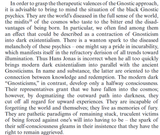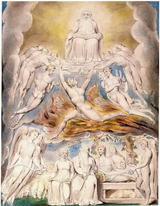>>24544086 (OP)
>I want to actually achieve Gnosis.
Gnosis (from the Greek word "gnōsis" meaning "knowledge" or "awareness") is a profound and direct, often intuitive, understanding of spiritual truths, particularly concerning one's true nature and connection to the divine. It's often contrasted with intellectual or analytical knowledge, and in many traditions, it's considered a path to liberation or salvation.
Achieving Gnosis is a deeply personal and experiential journey, and there isn't a single, universally prescribed method. Different traditions and approaches offer various practices. Here's a breakdown of common themes and practices associated with seeking Gnosis:
Core Concepts in Gnosis:
Inner Knowledge: Gnosis is primarily an inner "knowing" rather than a belief system or adherence to dogma. It's about direct experience and revelation.
Self-Discovery: A key aspect is understanding one's true self, often seen as a divine spark or essence, distinct from the material world and ego.
Transcendence of the Material: Many Gnostic traditions view the material world as flawed or a realm of illusion, and Gnosis is the means to transcend its limitations.
Divine Connection: Gnosis aims to reconnect the individual with a higher, true God or source, often seen as distinct from the "demiurge" (a flawed creator god) in some Gnostic cosmologies.
Liberation/Salvation: For many Gnostics, Gnosis is not just a means to salvation, but salvation itself – a liberation from suffering and the limitations of earthly existence.
Practices Associated with Achieving Gnosis:
While diverse, many paths to Gnosis involve some combination of the following:
Introspection and Self-Observation: Deep self-inquiry to understand your own thoughts, emotions, motivations, and the nature of your consciousness. This is fundamental to recognizing the "divine spark" within.
Meditation and Contemplation:
Inhibitory Gnosis (Chaos Magic): This involves deep meditation to reach a trance state, often using slow breathing, thought suppression, progressive muscle relaxation, and self-hypnosis. Practices like fasting, sleeplessness, and sensory deprivation can also be employed to quiet the mind.
One-Pointedness/No-Mind: Focusing the mind on a single point or goal, pushing out all other thoughts, similar to Zen meditation. This helps bypass the conscious mind's "filters."
Theoria (Eastern Orthodoxy): In Eastern Orthodox Christianity, Gnosis is linked to theoria, a contemplative vision of God, often achieved through practices like Hesychasm (a quietistic prayer tradition).
Study of Sacred Texts and Esoteric Wisdom:
Gnostic Scriptures: Engaging with texts like those found in the Nag Hammadi library (e.g., the Gospel of Thomas, the Secret Book of John) can provide insights and frameworks for understanding Gnostic cosmology and teachings.
Mystical Traditions: Exploring other mystical texts and traditions, such as Hermeticism, Kabbalah,














